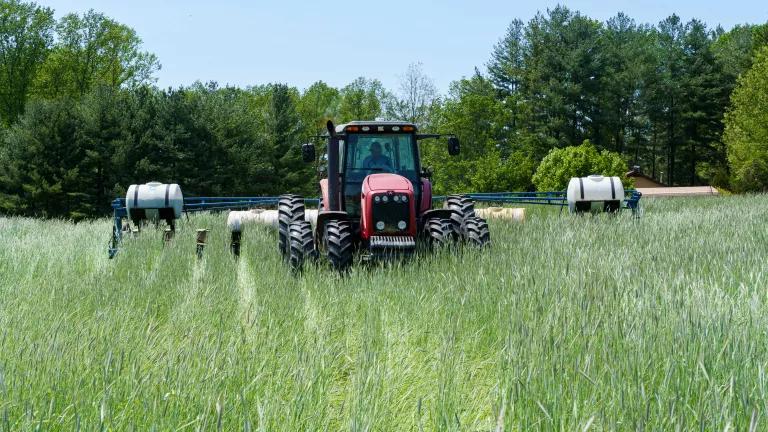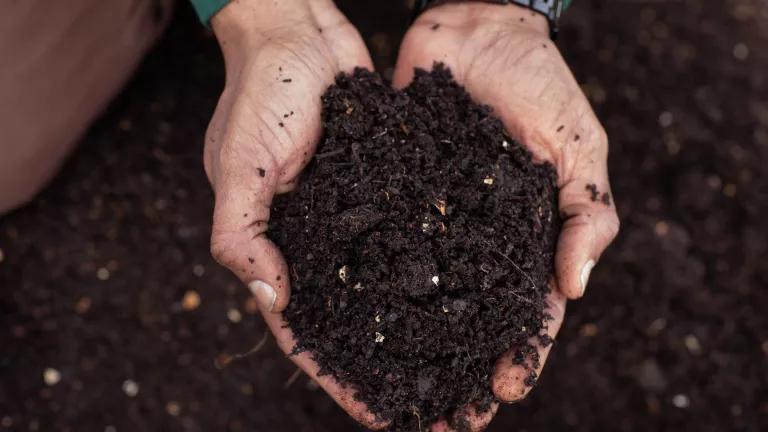Organic Transition Programs Can Transform Food Systems
USDA's $300 million Organic Transition Initiative offers meaningful investments in climate-friendly farming that meet urgent needs of communities across the country.

Farmer Gale and USDA Under Secretary of Agriculture for Marketing and Regulatory Programs Jenny Lester Moffitt discuss the organic transition process and how USDA resources can help
The U.S. Department of Agriculture’s (USDA) new $300 million Organic Transition Initiative offers meaningful investments in climate-friendly farming that meet urgent needs of communities across the country. The Initiative sets the stage for a food system transformation that makes organic the norm – by aligning public spending with public interests in thriving ecosystems and healthy, affordable food.
Organic farming offers sweeping health, climate, and economic benefits – but it’s not easy, especially at the beginning. Land must be managed organically – without synthetic fertilizers and most pesticides – for three years before crops can be sold as organic. During those three years, as the land and ecosystems heal and find new balance, producers may face increased pest pressure, short-term decreases in yields, and a steep learning curve.
“Farmers face challenging technical, cultural, and market shifts while transitioning to organic production, and even during the first years after successful organic certification.” ~ USDA Secretary Tom Vilsack
While many producers find that organic is worth it in the long run, the costs, time, and technical challenges involved in organic transition remain a barrier, especially for smaller operations with limited resources. As part of USDA's rollout of the new Organic Transition Initiative, Farmer Gale at Deep Roots Farm discussed her experience transitioning a new 53-acre farm to organic - from preliminary soil testing to restoring the soil to a "living organism" that can feed her community - and how USDA programs have helped.
Organic Transition Initiative Offers New Opportunities
The expertise, experience, and willpower to farm and ranch organically have existed – and persisted – for decades, as evidenced by the consistent growth of the organic sector. And yet, decades of agricultural policy and investments have trapped many producers, workers, and consumers in a system that relies heavily on harmful synthetic inputs and that values short-term yields over long-term sustainability, health, and equity.
Today, less than 1% of U.S. farmland is certified organic, and the number of non-certified farms actively transitioning to organic has dropped nearly 71% since 2008.
USDA’s Organic Transition Initiative seeks to shift that, by making a national commitment to organic agriculture, and the climate, health, and economic benefits that follow from it. The progress made through the Organic Transition Initiative will further the case for a wholesale realignment of our food and farm policies to ensure that organic agriculture and food are in reach for everyone.
The Initiative significantly expands resources for organic transition, inside and outside of USDA, with regionally relevant technical assistance, market development, and financial support that make organic more widely accessible:
- Wraparound technical assistance, through six regional partnerships: Through a new "Transition to Organic Partnership Program," USDA will collaborate with major organic organizations in six regions to develop regionally-tailored support networks for transitioning producers. These programs will include on-farm advising, workshops, and field days, as well as mentorship opportunities. USDA has committed to prioritizing equity in these programs and working with the regional partners to meet the needs of Black, Indigenous, and other producers of color.
- Targeted organic market development: After gathering stakeholder input, later this year USDA will identify market improvements that will increase stability in organic supply chains – from investments in processing and distribution infrastructure to developing markets for legumes and other edibles that are used to build soil health in crop rotations.
- Financial assistance through conservation and risk management programs: USDA’s Initiative will also ensure that existing programs work better for organic and transitioning producers. The Risk Management Agency (RMA) will introduce a new $25 million "Transitional and Organic Grower Assistance Program" (TOGA) with crop insurance subsidies for transitioning crops, organic grains and feed, and whole organic farms. And the Natural Resources Conservation Service (NRCS) will develop a new conservation practice standard for Organic Management, to make it easier for transitioning producers to use the Environmental Quality Incentives Program (EQIP) to cover the costs of organic planning, recordkeeping, and losses they may incur during the transition process.
These new investments will complement existing resources for organic producers, including the organic certification cost-share program that the Trump administration scaled back in the midst of the COVID crisis. With the 2023 Farm Bill on the horizon, there’s more work ahead to dramatically expand support for organic and build on investments like the Organic Transition Initiative.

Organic agriculture protects pollinators and people
In the meantime, USDA should follow the lead of existing organic transition programs (including those described below) to ensure that these new resources will reach the farmers and ranchers who need them most, and successfully cultivate a new crop of organic producers.
Organic Transition Programs Offer Models for Success
Organic transition programs put organic in reach for more farms. Whether providing technical advice on farming without synthetic inputs, translating paperwork and legal requirements, collaborating on a new marketing plan, or connecting producers with land in the first place, organizations that support producers through the transition period substantially reduce hurdles to organic.
Agriculture and Land-Based Training Association (ALBA): From Field Labor to Organic Farm Ownership
ALBA provides on-farm education opportunities for limited-resource farmers – mostly Mexican immigrant farmworkers – at their 100-acre organic farm and training facility in California’s Salinas Valley. They work with about 75 farmers every year, with a blend of classroom and field training and an Organic Farm Incubator program. The Incubator program helps new farmers launch their own businesses – through subsidized land rent, equipment, and intensive technical assistance – and then transitioning to their own farms after four years, in collaboration with other local partners.
Carlos Torres Gonzales and his wife, Maria Leticia Rojas, are among the many farmers who have worked with ALBA and partners to bring their small farm, Torres Organic Farm, to life. Carlos received five years of subsidized access to land, equipment, and intensive technical assistance in ALBA’s Organic Farm Incubator. After “graduating” from ALBA, a key partner, Kitchen Table Advisors, helped the family find seven acres to farm nearby – which meant that despite high land rents, the family was able to stay rooted in Salinas. The CCOF Foundation also recently awarded Torres Organic Farm a three-year Organic Transition grant to support the development of his business and increase organic acreage in the region. Carlos and Maria intend to use the funds to cover some operational costs during this vulnerable transition time, as well as implement conservation practices to build the soil, prevent erosion, and increase habitat for beneficial insects.
Cottage House Incorporation: Training Underserved Producers and Youth to Go Organic
Barbara Shipman, an African-American woman and fifth-generation farmer, founded Cottage House Incorporation to inspire youth and promote sustainable agricultural solutions and economic development in the southeast. Shipman uses her expertise as an organic farmer to help new and beginning farmers, socially disadvantaged farmers, and women achieve organic certification and run successful businesses. Cottage House has also hosted over 1,000 children per year at workshops that introduce them to farming, animal husbandry, planting and markets. Cottage House teaches an average of 20 new farmers per year to plan, plant, and operate farm businesses.
Georgia Organics: Building Organic Relationships and Business Skills
Georgia Organics more than doubled the number of organic farms in the state through its organic transition campaign – bringing nearly 3,000 more acres under organic management. They prioritize direct outreach to farmers and provide advice and assistance with paperwork and organic requirements. They also pair their organic transition work with an “accelerator program” that coaches farmers on business planning, recordkeeping, and other skills that support financial stability for farms. They point to staff training on the organic certification process and maintaining close relationships with producers as two key elements of their success.
One of their program participants, Sedrick Rowe, is building the organic peanut sector in Georgia, one farmer at a time. Rowe worked with Georgia Organics to experiment with organic peanut production and build the Georgia Organic Peanut Association. He entices more farmers to transition by showing that organic peanut production is both healthier and more profitable.
Rodale Institute: Translating Organic Research to Practice
The Rodale Institute offers technical assistance to support regenerative organic farming across the country. The organization has 14 full-time consultants who advise on everything from using roller crimpers for reduced tillage to filling out organic certification paperwork.
Pennsylvania, the first state in the country to adopt its own Farm Bill, has committed to expanding organic production, to meet growing demand. As part of that commitment, Pennsylvania has partnered with Rodale to offer free technical assistance on organic transition for any farmer in the state. Rodale’s consultants help farmers put the Institute’s research into practice – including findings from a 40-year side-by-side Farming Systems Trial that found organic management can generate yields up to 40% higher than conventional farming in drought years.
Organic Agronomy Training Service (OATS): Training the Trainers to Speak Organic
The Organic Trade Association’s OATS program fills a resource gap for transitioning producers by training agricultural professionals, including agronomists, certified crop advisors, extension agents, and technical service providers, to work with organic farms and ranches. The program includes a podcast to introduce “skeptical” agronomists and consultants to organic, an online training program, custom group trainings, regionally-adapted programming, and on-farm field days, as well as networking opportunities.
Ohio Ecological Food and Farm Association (OEFFA): Making Organic Certification Easier
Many organic certifiers work with producers during their three-year transition period, to ensure that new organic farmers and ranchers use only allowed fertilizers and pest control materials and become familiar with certification requirements. Among its many farmer education and support programs, OEFFA runs an organic transition program that walks producers through the steps, including videos, workbooks, mock inspections, and recordkeeping models. They also organize farm tours and support local chapters where farmers can share information. In 2020, OEFFA offered one-on-one technical assistance to over 500 farmers, including 75 beginning farmers and 73 transitional farmers; this support assisted with the conversion of more than 6,000 acres to new organic grain production.




